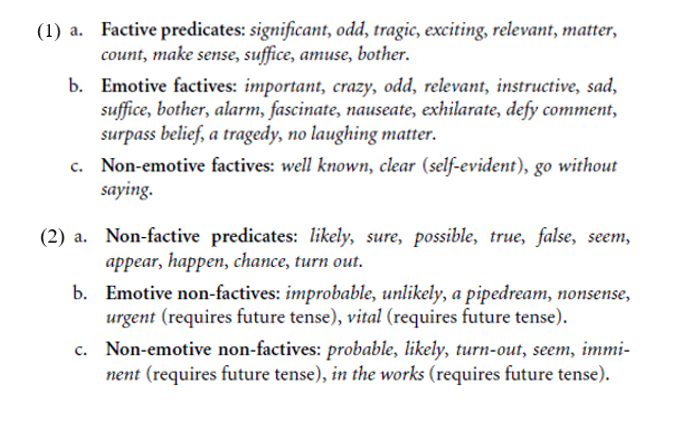


 Grammar
Grammar
 Tenses
Tenses
 Present
Present
 Past
Past
 Future
Future
 Parts Of Speech
Parts Of Speech
 Nouns
Nouns
 Verbs
Verbs
 Adverbs
Adverbs
 Adjectives
Adjectives
 Pronouns
Pronouns
 Pre Position
Pre Position
 Preposition by function
Preposition by function 
 Preposition by construction
Preposition by construction
 Conjunctions
Conjunctions
 Interjections
Interjections
 Grammar Rules
Grammar Rules
 Linguistics
Linguistics
 Semantics
Semantics
 Pragmatics
Pragmatics
 Reading Comprehension
Reading Comprehension
 Teaching Methods
Teaching Methods|
Read More
Date: 2024-01-20
Date: 2024-01-06
Date: 2024-01-05
|
Discourse adjectives are not factive
Kiparsky and Kiparsky’s list of factive predicates is presented in (1), and their list of non-factive predicates is provided in (2).

Kiparsky and Kiparsky characterize the class of factive predicates as based on presuppositions in the sense of “propositions that the speaker presupposes to be true” (1971: 147). For them, factivity depends on presupposition rather than assertion. Factive predicates presuppose the truth of their complement. That is, a sentence A presupposes a sentence B if and only if B is true whether or not A is true or false.
It is noteworthy that Kiparsky and Kiparsky categorize clear as a factive predicate. In what follows I show that clear is in fact not factive, though I admit that it has a strong flavor of factivity. Consider the pair of sentences in (3).

Sentence (3) seems to entail that Briscoe is a detective. That is, an initial assumption an addressee may make after hearing an utterance of (3) is that Briscoe is a detective. A standard cancellation test as applied in (3b) shows that the entailment can be canceled, indicating that clear doesn’t entail the truth of its complement proposition.
What have now become standard diagnostics for presupposition as it relates to factivity are that the presuppositions remain constant under negation and questioning. The interaction of negation with factive verbs is illustrated in (4).

In (4), only the emotive reaction to the embedded proposition is negated. The sentences still presuppose that the embedded proposition (here, the proposition expressed by the sentence the door is closed) is true. As a result, overtly denying that the door is closed leads to a contradiction unless the utterance is meant to challenge the appropriateness of the choice of the word odd or regret in a metalinguistic use of negation (Horn 1985, 1989). As a result, overt cancellation of this proposition results in a contradiction, as shown in (5).

The presuppositions of discourse adjectives, unlike the presuppositions of true factives, do not remain constant under negation. Thus, in contrast to the sentences in (5), the sentences in (6) are not contradictory.

With respect to the constancy of presuppositions under questioning, Kiparsky and Kiparsky discuss the example in (7).

When a speaker utters (7) the conveyed meaning is not an inquiry as to whether or not the money is gone. Rather, it takes for granted that the money is gone, and questions the addresseeطs reaction to that fact. Discourse adjectives fail to pattern like true factives with respect to this diagnostic as well. Consider (8).
(8) Is it clear that our money is gone?
While it is possible to interpret a speaker’s utterance of (8) as an indication that she believes the money is gone and is inquiring about the addressee’s reaction to this fact, this is not the only reading possible. That is, (8) is indeterminate between a reading in which the speaker is questioning whether or not the money is gone, and questioning whether or not this is clear to the addressee.
|
|
|
|
مقاومة الأنسولين.. أعراض خفية ومضاعفات خطيرة
|
|
|
|
|
|
|
أمل جديد في علاج ألزهايمر.. اكتشاف إنزيم جديد يساهم في التدهور المعرفي ؟
|
|
|
|
|
|
|
العتبة العباسية المقدسة تقيم ندوة علمية عن روايات كتاب نهج البلاغة
|
|
|